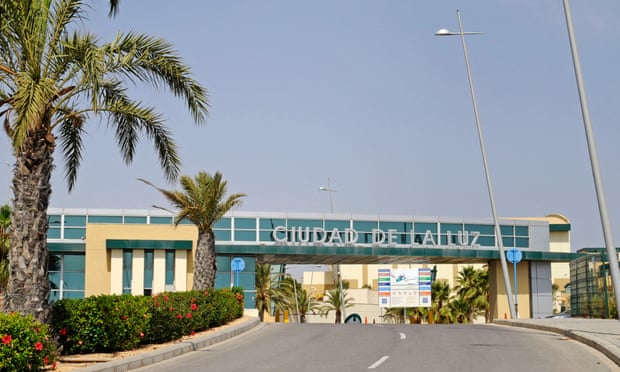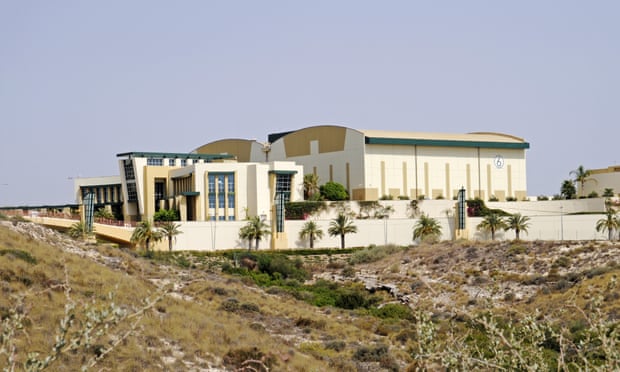Alicante complex praised by director Ridley Scott hopes to make 26 major films and more than 200 productions in next five years.

One of Spain’s most notorious and costly white elephants, the Ciudad de la Luz (City of Light) film studios in Alicante, is to get a new lease of life 10 years after it was forced to shut by the EU on grounds of unfair competition.
The Valencian regional government has announced that the studios will reopen, with productions expected to begin later this year. Brussels had banned it from operating until 2027 after production companies, including Pinewood Studios in London, complained that government subsidies broke EU competition rules.
Without revealing any details of the talks, Josefina Bueno, a Valencian minister, said it was thanks to the local government’s “tireless efforts to persuade the European authorities of the seriousness of its economic and political project that the sanction was lifted” early.
The studios hope to make 26 major films and more than 200 productions over the next five years, creating 4,900 jobs and generating €850m (£730m) in revenue for a region with an unemployment rate of 13%.
Streaming services have created a huge demand for crew and studio space, and Spain is well placed to take advantage of these opportunities.
A large pool of technical expertise and lower costs have made Spain an increasingly popular location for foreign productions, with scenes from series such as Game of Thrones and Black Mirror being shot there.

Kevin Loader, whose production credits include Enduring Love and My Cousin Rachel, said there was a global shortage of crew. Additionally, as a result of Brexit the industry had “lost the flexibility to bring in people from EU countries” to the UK. “In the past, people used to bring in entire lighting crews from Spain but clearly that’s no longer possible. A lot of UK crew are trying to get EU passports.”
However, he points out that the European Convention on Cinematographic Co-Production is a pan-European, not an EU, agreement and is not affected by Brexit. He believes this will lead to more UK-European co-productions as a way around the strictures imposed by Brexit.
The film director Ridley Scott once described the Alicante complex as “the finest facilities in the world”, but the studios fell into disuse after the EU ban and have since been used by some digital start-ups and as a Covid vaccination centre. The site currently provides a temporary home for Ukrainian refugees.
Between 2005 and 2012, the six sound stages produced 36 films, of which the most famous was Juan Antonio Bayona’s tsunami movie, The Impossible, starring Naomi Watts. Asterix at the Olympic Games, starring Gérard Depardieu, was also shot there.
By then the studios had absorbed about €400m in public money, much of which the European Commission said had to be repaid.
Attempts by a consortium that included associates of the US director Francis Ford Coppola to acquire the complex in 2017 came to nothing.
Eventually, the EU said it had to be auctioned off to the highest bidder but no one was prepared to meet the minimum asking price, a third of its overall value.
Now Valencia’s government has created a film commission to promote the studios. “We hope to turn the complex into a European role model for audio-visual production,” said Ximo Puig, the Valencian president.
It is hoped that the management of the site will be better than last time around, when at least one producer complained that it was run by people who knew nothing about film-making.
Sign up to First Edition, our free daily newsletter – every weekday morning at 7am BST
Eva Andújar, a production coordinator, had said it was probably the only studio in the world that closed at the weekend, and that on one occasion a doorman refused the film-maker Quentin Tarantino admission because he didn’t have a security pass.
Ciudad de la Luz is just one of Spain’s many white elephants. Before the 2008 financial crash put a stop to it, Spain’s regional governments vied with each other to build pharaonic projects, bankrupting most of Spain’s savings banks in the process and leaving the country saddled with at least three airports with no planes, high-speed rail connections with no passengers and stretches of motorway without cars, not to mention unfinished or abandoned cultural institutions, conference centres and sporting arenas.
… as you’re joining us today from Spain, we have a small favour to ask. Tens of millions have placed their trust in the Guardian’s fearless journalism since we started publishing 200 years ago, turning to us in moments of crisis, uncertainty, solidarity and hope. More than 1.5 million supporters, from 180 countries, now power us financially – keeping us open to all, and fiercely independent.
Unlike many others, the Guardian has no shareholders and no billionaire owner. Just the determination and passion to deliver high-impact global reporting, always free from commercial or political influence. Reporting like this is vital for democracy, for fairness and to demand better from the powerful.
And we provide all this for free, for everyone to read. We do this because we believe in information equality. Greater numbers of people can keep track of the events shaping our world, understand their impact on people and communities, and become inspired to take meaningful action. Millions can benefit from open access to quality, truthful news, regardless of their ability to pay for it.
Every contribution, however big or small, powers our journalism and sustains our future. Support the Guardian from as little as €1 – it only takes a minute. If you can, please consider supporting us with a regular amount each month. Thank you.
